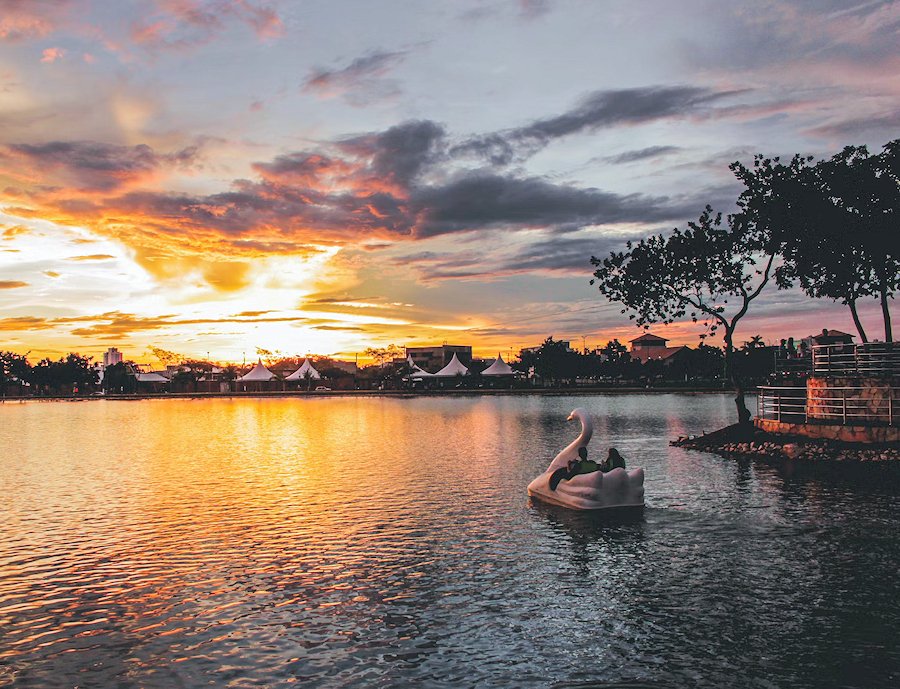 Football Index:
World Cup Finals:
Brazil 2014: Cuiaba - Arena Pantanal.
Football Index:
World Cup Finals:
Brazil 2014: Cuiaba - Arena Pantanal.
Arena Pantanal in Cuiaba plays host to four, group stage, World Cup matches.
In the group stage, Cuiaba hosted fans from ![]() Australia,
Australia, ![]() Bosnia,
Bosnia, ![]() Chile,
Chile, ![]() Colombia,
Colombia, ![]() Japan,
Japan, ![]() Nigeria,
Nigeria, ![]() Russia and
Russia and
![]() South
Korea.
South
Korea.
Cuiaba
Located 2,000 km from the Atlantic and 2,000 km from the Pacific, Cuiaba is the capital of the state of Mato Grosso.
Founded during the Brazilian Gold Rush, in 1719, the centre of Cuiaba contains several historical buildings that were declared national heritage sites in 1992.
To better understand the history of Cuiaba, visit to the Cultural Foundation, which has four museums: the Natural History Museum, Anthropology, Sacred Art and the Historic Museum.
Another two important museums in Cuiaba are the Rondon Museum and the Stones Museum of Ramis Bucair.
Football in Cuiaba
The most important club in the state of Mato Grosso is Mixto Esporte Clube, from Cuiaba.
The main city rivals are Cuiaba Esporte Clube and Clube Esportivo Dom Bosco.
Arena Pantanal - Cuiaba
2014 World Cup Finals fixtures played at Arena Pantanal.
Friday, 13th June
Group B
![]() Chile vs Australia
Chile vs Australia ![]() (3:1)
(3:1)
Tuesday, 17th June
Group H
![]() Russia vs South Korea
Russia vs South Korea ![]() (1:1)
(1:1)
Saturday, 21st June
Group F
![]() Nigeria vs Bosnia-Herzegovina
Nigeria vs Bosnia-Herzegovina ![]() (1:0)
(1:0)
Tuesday, 24th June
Group C
![]() Japan vs Colombia
Japan vs Colombia ![]() (1:4)
(1:4)
Cuiaba Accommodation
Where to Stay in Cuiaba
Cuiaba Tourism
Cuiaba is nicknamed the ‘Green City' thanks to its proximity to three of Brazil's most important ecosystems: the savannahs of the Cerrado; the wetlands of the Pantanal; and the Amazon.
Cerrado Savannahs
Located between the Amazon, Atlantic Forests and Pantanal, the Cerrado is the largest savanna region in South America.
The beautiful Cerrado contains 5% of all life on Earth and there is so much to discover there.
Pantanal Wetlands
Although not as well known as the Amazon Rainforest to its north, the gigantic seasonal floodplain of the Pantanal is also home to a staggering variety of plants and wildlife.
Travel to Cuiaba
Cuiaba by Air
The Marechal Rondon International Airport is located in the adjoining municipality of Varzea Grande.
Cuiaba by Road
Empresa de Transportes Andorinha connects Cuiaba with Sao Paulo and Campo Grande.
Travel to Brazil
Brazil Travel Notes:
Brazil tourist information with details about travel to and around the country. Where to
stay and what to see is made easier with insider tips and hand-selected Brazil links, by
dedicated editors and visitors to TravelNotes.org - The Online Guide to Travel.
2014 World Cup Cities
Belo Horizonte: 1st Round (4) - Second Round - Semi-final.
Brasilia: 1st Round (4) - Second Round - Quarter-final - Third Place Match.
Cuiaba: 1st Round (4).
Curitiba: 1st Round (4).
Fortaleza: 1st Round (4) - Second Round - Quarter-final.
Manaus: 1st Round (4).
Natal: 1st Round (4).
Porto Alegre: 1st Round (4) - Second Round.
Recife: 1st Round (4) - Second Round.
Rio de Janeiro: 1st Round (4) - Second Round - Quarter-final - 2014 World Cup Final.
Salvador: 1st Round (4) - Second Round - Quarter-final.
Sao Paulo: 1st Round (4) - Second Round - Semi-final.
The Road to Rio
2014 World Cup Finals - Knockout Stage.
World Cup Finals
Uruguay 1930:
Uruguay trailed Argentina at half-time (1:2) but replied with three goals in the second half; to win the first ever World Cup Final (4-2)
on July 30th, 1930.
Italy 1934:
Italy were one of the countries who missed out on the vote to host the first World Cup but managed to win the prestigious golden trophy
for the home fans.
France 1938:
The third World Cup was held in Europe for a second time, although Germany had annexed Austria, and Spain was in civil turmoil.
Brazil 1950:
Although no cup-final as such, Uruguay and Brazil went into their final game with the winner guaranteed to be champions; a draw would be enough for Brazil.
Switzerland 1954:
The fifth World Cup tournament produced a record number of goals, including a 7:5 encounter between Austria and Switzerland in Lausanne.
Sweden 1958:
Brazil presented a 17 year-old Pele to the world; who went on to claim a hat-trick in Brazil's 5:2 semi-final win over France and bag another two in the final.
Chile 1962:
Czechoslovakia overcame Hungary in the quarter-finals and Yugoslavia in the semis, while Brazil took care of England and the host nation, Chile.
England 1966:
Geoff Hurst scored a hat-trick, in the final against West Germany, as England triumphed in a thrilling game watched by Her Majesty, Queen Elizabeth II.
Mexico 1970:
1970 belonged to Pelé, who earned his third World Cup winners' medal when Brazil got their hands on the Jules Rimet Cup.... for keeps.
W. Germany 1974:
Johan Cruyff was the player of the tournament as total football became the buzzword of the day, even though Holland lost to West Germany in the 1974 final.
Argentina 1978:
Holland contested the 1978 World Cup Final, in Argentina, for the second time in a row. As in West Germany,
they again finished runners-up; to the hosts.
Spain 1982:
The Spain 82 World Cup finals increased to 24 teams and the format was changed to have two group stages, with four second-round groups of three.
Mexico 1986:
In 1986, Mexico became the first nation to stage the World Cup Finals for a second time; having only staged the competition sixteen years previously.
Italy 1990:
In 1990, Italy became the World Cup of stalemates. Both semi-finals were drawn out through penalty kicks. In the final itself, the only goal came from the spot.
USA 1994:
Once Team US had played a few games most of the nation began to understand they were hosting the greatest show on earth and how the game was played.
France 1998:
France became the sixth nation to win the World Cup on home soil. Thirty-two teams competed in the 16th World Cup; better known as France 98.
Korea-Japan 2002:
The 17th World Cup, held in Korea and Japan, was the first World Cup finals to be shared by two hosts and the first to be held in Asia.
Germany 2006:
The 2006 World Cup Finals ran from 9th June to 9th July; the opening
match in Munich and the final in Berlin. Munich and Dortmund hosted the
semi-finals.
South Africa 2010:
Eighty years after the First World Cup Finals in Uruguay, the world's most prestigious football competition was finally hosted on the African continent.
Brazil 2014:
Five times World Cup Champions, Brazil, get a second chance to hold the prestigious World Cup Finals; 64 years after they last hosted the tournament.
Russia 2018:
VAR made its World Cup debut and set out to change the course of a game with some crucial rule infringement watching and vital on the spot decisions.
Qatar 2022:
When FIFA executives met in Zurich to decide on who would host the 2018 and 2022 World Cup Finals, Qatar was probably the biggest surprise to many.
United 2026:
The 2026 FIFA World Cup Finals will be jointly hosted by Canada, Mexico
and the United States. The United Bid won the hosting rights ahead of
Morocco.
Travel Notes Online Guide to Travel
Africa - Asia - Caribbean - Europe - Middle East - North America - Oceania - South America.
The Travel Notes Online Guide to Travel helps visitors plan their trip with country and city travel guides, local tourist information, reviewed web sites, and inspiring travel content.




